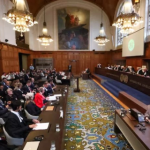The United States has pledged over $31 million to enhance Kenya’s healthcare infrastructure by establishing a digital superhighway, a move announced following talks between Presidents Joe Biden and William Ruto during Ruto’s state visit to the US.
The collaboration between the US and Kenya’s Ministry of Health aims to implement digital health solutions to bolster disease management programs and enhance the capacity to prevent, detect, and respond to public health threats.
Notably, $4 million from USAID Power Africa’s Health Electrification and Telecommunications Alliance will support solar power solutions for health facilities and enhance community and facility information systems, particularly to improve maternal and newborn care.
Additionally, the National Institutes of Health’s Harnessing Data Science for Health Discovery and Innovation in Africa (DS-I Africa) program will support data science initiatives in Kenya to impact health outcomes positively.
Moreover, the two Presidents discussed strategies to combat malaria, with the US contributing $33.5 million through the President’s Malaria Initiative (PMI) in 2023 to fight the disease in Kenya.
Biden emphasized the US’s commitment to strengthening health systems in Kenya by training healthcare workers, optimizing supply chains, enhancing data monitoring, and supporting national health policies, leading to a 50% reduction in malaria prevalence over the past decade.
Furthermore, in line with Kenya’s localization objectives, PMI plans to procure additional malaria treatments and preventive treatment doses from Kenyan manufacturers in 2024.
In other initiatives, the US International Development Finance Corporation (DFC) is investing in Kenya’s private sector by providing a direct loan to Hewa Tele company, which supplies medical oxygen to healthcare facilities in Africa.
Additionally, the US made equity investments in Kasha Global, a Kenya-based e-commerce company focusing on providing healthcare and beauty products to low-income women in Kenya and Rwanda.
Furthermore, both countries reaffirmed their longstanding partnership through a Memorandum of Understanding (MoU) between the Centers for Disease Control and Prevention (CDC) and the Kenyan Medical Research Institute (KEMRI).
This MoU aims to support Kenya’s Applied Science Hub, which builds on decades of collaborative research on various health issues, including malaria, HIV, tuberculosis, and COVID-19.
The research conducted in the Applied Sciences Hub will expand surveillance efforts, address critical public health questions, and introduce innovative diagnostic methods, with the US providing significant financial support to KEMRI through the CDC, NIH, and the Department of Defense. Additionally, the NIH supported numerous grants to US organizations collaborating with Kenyan counterparts, covering a wide range of biomedical research topics, further strengthening the research partnership between the two countries.



